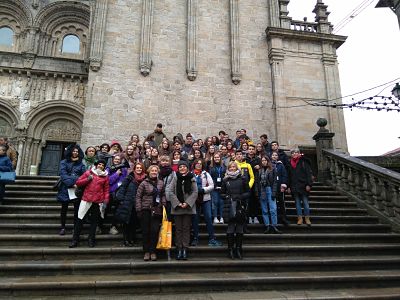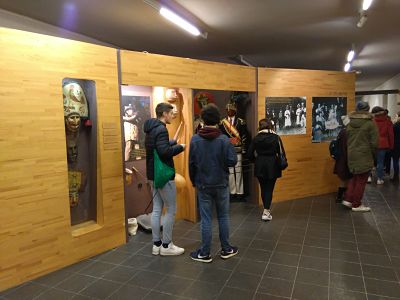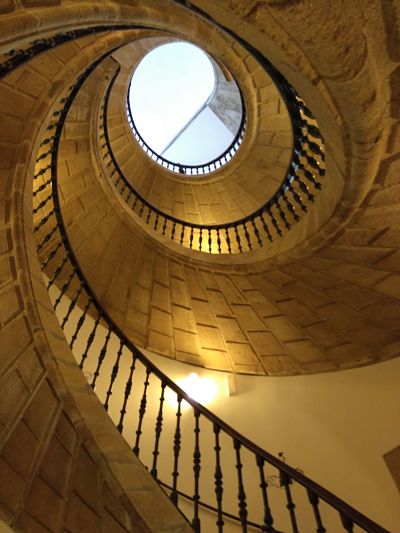On Saturday 3rd, we went to Santiago de Compostela.
We visited tha town and we read poems by women in the different languages in the Praza de Praterías.

We also visited the Museo do Pobo Galego to find out more about Galician women.


The manifesto and the poems
Santiago de Compostela. Praza de Praterías – 3 February 2018
Santiago de Compostela.
People from all over the world.
Hundreds of years of shared interests and values.
Today, we are students from 5 different European countries.
We worry about Human Rights.
We worry about women and their problems today.
Praza de Praterías, in English, square of silversmiths. The past and the present of a tradition of artisans.
Praza de Praterías. Women.
The Fountain of the Horses.
The woman with a star on top is the symbol of Compostela.
A fountain. Women carrying heavy pots of water in the past. Women, traditional water providers yesterday here and today still in many parts of the world. But also, women’s everyday meeting point in the past.
The Romanesque façade of this cathedral. Representative of women in their traditional roles: saints and sinners.
To the right, Virgin Mary, symbol of purity and mother of God, distanced from carnal desires and a role model for women.
To the left, Eve, responsible for death on Earth, and a figure with a skull on her lap which is said to be either the very Eve or the adulteress, condemned by her husband to carry and kiss the skull of her dead lover twice a day.
Here we want to shout against women’s discrimination, against violence towards women, and we want to make of this, a claim for respect and freedom.
We compromise to reflect and help overcome these inequalities in our daily lives.
Also, as a group of worried and committed European teenagers, we will create a book club and share literary texts by women.
Here we want to raise our voice against women’s discrimination.
And we’ll do it by reading texts written by women in five different languages, the languages of our countries: France, Greece, Italy, Romania and Spain.
France. A witch like the others by Anne Sylvestre read by Gaya Redoute
Greece. Recognition Sign by KIKI DIMOULA read by Gina Kalliora
Italy. TO WOMEN by Alda Merini read by Alessia Maffei
Romania. Game by Ileana Malancioiu read by Stefania Gazacu
Spain. WOMEN text written in Galician by Iria Rivas read by Lara Barroso
France
|
Anne Sylvestre ‘Une sorcière comme les autres’
Je vous ai porté vivant
Je vous ai porté enfant
Dieu comme vous étiez lourd
Pesant votre poids d’amour
Je vous ai porté encore
À l’heure de votre mort
Je vous ai porté des fleurs
Je vous ai morcelé mon coeur
Quand vous jouiez à la guerre
Moi je gardais la maison
J’ai usé de mes prières
Les barreaux de vos prisons
Quand vous mourriez sous les bombes
Je vous cherchais en hurlant
Me voilà comme une tombe
Avec tout le malheur dedans
Ce n’est que moi, c'est elle ou moi
Celle qui parle ou qui se tait
Celle qui pleure ou qui est gaie
C’est Jeanne d’Arc ou bien Margot
Fille de vague ou de ruisseau
Et c'est mon coeur ou bien le leur
Et c'est la soeur ou l’inconnue
Celle qui n’est jamais venue
Celle qui est venue trop tard
Fille de rêve ou de hasard
Et c’est ma mère ou la vôtre
Une sorcière comme les autres
|
Anne Sylvestre, A witch like the others
I carried you alive
I carried you child
God how heavy you were
Weighing your love weight
I carried you again
At the time of your death
I brought you flowers
I split my heart for you
When you played war
I kept the house
I used my prayers
The bars of your prisons
When you died under the bombs
I was looking for you screaming
Here I am like a grave
With despair inside me
It's only me, it's her or me
The one who speaks or is silent
The one who cries or is happy
It's Joan of Arc or Margot
Daughter of a wave or stream
And it's my heart or theirs
And it's the sister or the unknown
The one that never came
The one that came too late
Daughter of chance or dreams
And it's my mother, or yours
A witch like the others
|
Greece
|
Σημεῖο Ἀναγνωρίσεως
ἄγαλμα γυναίκας μέ δεμένα χέρια
Ὅλοι σέ λένε κατευθείαν ἄγαλμα,
ἐγώ σέ πρσφωνῶ γυναίκα κατευθείαν.
Στολίζεις κάποιο πάρκο1.
Ἀπό μακριά ἐξαπατᾶς.
Θαρρεῖ κανείς πώς ἔχεις ἐλαφρά ἀνακαθήσει
νά θυμηθεῖς ἕνα ὡραῖο ὄνειρο πού εἶδες,
πώς παίρνεις φόρα νά τό ζήσεις.
Ἀπό κοντά ξεκαθαρίζει τό ὄνειρο:
δεμένα εἶναι πισθάγκωνα τά χέρια σου
μ' ἕνα σκοινί μαρμάρινο
κι ἡ στάση σου εἶναι ἡ θέλησή σου
κάτι νά σέ βοηθήσει νά ξεφύγεις
τήν ἀγωνία τοῦ αἰχμάλωτου.
Ἔτσι σέ παραγγείλανε στό γλύπτη:
αἰχμάλωτη.
Δέν μπορεῖς
οὔτε μιά βροχή νά ζυγίσεις στό χέρι σου,
οὔτε μιά ἐλαφριά μαργαρίτα.
Δεμένα εἶναι τά χέρια σου.
Καί δέν εἶν' τό μάρμαρο μόνο ὁ Ἄργος.2
Ἄν κάτι πήγαινε ν' ἀλλάξει
στήν πορεία τῶν μαρμάρων,
ἄν ἄρχιζαν τ' ἀγάλματα ἀγῶνες
γιά ἐλευθερίες καί ἰσότητες,
ὅπως οἱ δοῦλοι,
οἱ νεκροί
καί τό αἴσθημά μας,
ἐσύ θά πορευόσουνα
μές στήν κοσμογονία τῶν μαρμάρων
μέ δεμένα πάλι τά χέρια, αἰχμάλωτη.
Ὅλοι σέ λένε κατευθείαν ἄγαλμα,
ἐγώ σέ λέω γυναίκα ἀμέσως.
Ὄχι γιατί γυναίκα σέ παρέδωσε
στό μάρμαρο ὁ γλύπτης
κι ὑπόσχονται οἱ γοφοί σου
εὐγονία3 ἀγαλμάτων,
καλή σοδειά ἀκινησίας.
Γιά τά δεμένα χέρια σου, πού ἔχεις
ὅσους πολλούς αἰῶνες σέ γνωρίζω,
σέ λέω γυναίκα.
Σέ λέω γυναίκα
γιατ' εἶσ’ αἰχμάλωτη.
(Τό λίγο τοῦ κόσμου, 1971)
Κική Δημουλά
  
|
Recognition Sign
(a statue of a woman with tied hands)
KIKI DIMOULA
(Translation: Maria Dimitropoulou 28/1/2018)
They all call you a statue, straight away,
I, straight away, call you a woman.
The ornament of a park. (1)
Misleading us from a distance.
One might think you have lightly sat up
to remember a fine dream you saw,
that you are speeding up to live it.
But coming closer, the dream is revealed:
your hands are tied up behind your back
with a marble rope
and your posture is your will
for something to help you escape
from the agony of a captive.
That’s how you were ordered to the sculptor:
a captive.
You cannot even
weigh a rain in your hand,
not even a light daisy.
Tied up are your hands.
And your Argus is not only the marble. (2)
If something was about to change
in the course of the marbles,
if the statues started fights
over freedoms and equalities,
just like the slaves would do
or the dead
and our feeling,
you would walk through
the cosmogony of the marbles
having your hands tied up once more, a captive.
You are instantly called a statue,
I call you instantly a woman.
Not because you were handed in by the sculptor
as a woman to the marble
and your hips promise
good and affluent birth of statues,
good harvest of immobility.
It’s for the tied hands you have
throughout all the centuries that I have known you
that’s why I call you a woman.
I call you a woman
because you are a captive.
- It’s about the marble sculpture of Konstantinos Seferlis “The Northern Epirus” (1951) which is situated at the Tositsa Square in Athens. The tied up woman is perceived, not as a historical and national allegory, but rather as a symbol of social oppression of women.
- Argus Panoptes, is a many-eyed giant in Greek mythology set by Hera as a very effective watchman of Io. Io has been the mythic symbol of the oppressed and persecuted woman
|
Italy
|
TO WOMEN
Alda Merini (1995)
Fragile, opulenta donna, matrice del paradiso
sei un granello di colpa
anche agli occhi di Dio
malgrado le tue sante guerre
per l’emancipazione.
Spaccarono la tua bellezza
e rimane uno scheletro d’amore
che però grida ancora vendetta
e soltanto tu riesci
ancora a piangere,
poi ti volgi e vedi ancora i tuoi figli,
poi ti volti e non sai ancora dire
e taci meravigliata
e allora diventi grande come la terra
e innalzi il tuo canto d’amore.
|
TO WOMEN
Alda Merini (1995)
Fragile, opulent woman, matrix of paradise
you are a grain of guilt
even in the eyes of God
despite your holy wars
for emancipation.
They split your beauty
of which a skeleton of love remains
which, however, still cries for revenge
and you are the only one
who can still cry;
then you turn and see your children again,
then you turn around and you still can not express
the amazement and joy
and then you become as big as the earth
and raise your song of love.
|
Romania
|
Joc
de Ileana Malancioiu
Îmi iau numărul meu de pietre
şi le aşez cât mai riscant
şi-ncep jocul convinsă
că oricum voi pierde.
De ce joci, totuşi?
mă veţi întreba.
Ce altceva pot să fac?
vă voi răspunde.
Apoi liniştită
voi muta mai departe
piatră după piatră
munte după munte.
|
Game
by Ileana Malancioiu
I get my number of stones
and place them as risky as possible
I start to play convinced
that I will lose anyway.
Why do you play, though?
you will ask me.
What else can I do?
I will answer you.
Then quiet
I will keep on moving
stone after stone
mountain after mountain.
|
 *Ileana Mălăncioiu (January 23, 1940) is a contemporary poet and a Romanian essayist, publicist, dissident and civic activist. Her work was censored by the communist regime.
*Ileana Mălăncioiu (January 23, 1940) is a contemporary poet and a Romanian essayist, publicist, dissident and civic activist. Her work was censored by the communist regime.
Since March 2013 she has been a member of the Romanian Academy.
Spain
|
Mulleres de Iria Rivas
Mulleres que loitan,
curan,
aman,
fin,
choran,
e crían.
Mulleres que abrazan
que danzan
traballan, xogan e saen.
Mulleres escultura, compañeiras de vida.
Mulleres que abren,
camiños e vidas.
Mulleres que aman,
mulleres obxecto obrigadas a vivir
nunha sociedade patriarcal,
mulleres que saben,
mulleres que aman.
Mulleres que gobernan,
mulleres motor,
Frida,Marie,Jane,Alva,Wangari,
Malala.
Mulleres vida, mulleres Nobel.
Mulleres, nazis, fillas, avoas e
persoas.
Mulleres.
Ti.
Eu.
|
Women by Iria Rivas
Women who fight,
heal,
love,
end,
cry,
and create.
Women who embrace
who dance
work, play and go out.
Sculpted women,
partners in life.
Women who open,
paths and lives.
Women who love,
objectified women, forced to
live
in a patriarchal society,
women who know,
women who love.
Women who rule,
engine women,
Frida, Marie, Jane, Alva, Wangari,
Malala.
Living women, Nobel women.
Women, Nazis, daughters, grandmothers and
people.
Women.
You.
I.
|
*Iria Rivas is a poet and student in IES San Rosendo. She has won sereral prizes for her poetry and short stories.